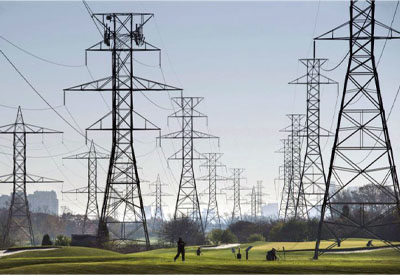Toronto Region Board of Trades Recommends Privatizing Ontario Hydro Distribution

November 30, 2017
One of the largest chambers of commerce in Canada is calling for wider privatization of electricity distribution companies to increase competitiveness in an attempt to drive down costly Ontario electricity prices over the long-term.
In a report to be released Tuesday and obtained by The Canadian Press, the Toronto Region Board of Trade makes sweeping recommendations aimed at changing the province’s troubled energy sector.
PRIVATIZE LOCAL DISTRIBUTION RUN BY MUNICIPALITIES
In the first of several reports to be released ahead of Ontario’s 2018 provincial election called “Agenda for Growth,” the board urges the province’s political parties to adopt its findings to fix the system.
Board CEO Jan De Silva said the one of the report’s key recommendations is to privatize — by a maximum of 10 per cent initially — portions of local hydro distribution companies which are now run by municipalities. That would lead to more innovation, more efficient operation and would benefit businesses and consumers, she said.
“I think the big opportunity to truly transform how we get ahead of a problem that we’ve backed ourselves into on hydro is looking at opportunities to privatize,” she said. “To bring more competitive forces into play.”
“The (distribution companies) that are sitting under government control are the ones where choices get made for a number of reasons over time but they have really burdened businesses and taxpayers with an unaffordable hydro system,” she added.
In 2015, the Liberal government announced it would sell 60 per cent of Hydro One shares with the intent of raising billions to fund transit and infrastructure projects. More than a year before the Liberal government announced in 2015 that it would partially privatize Hydro One, polling showed strong opposition to the idea.
Pollara conducted research at the government’s behest in January and February of 2014 asking people for their thoughts on selling Hydro One, and just 25 per cent of respondents supported the idea.
De Silva conceded the recommendation won’t be popular because of the large public backlash to the provincial privatization of Hydro One, but said a broader discussion of the benefits of business involvement needs to start. Ontario’s NDP have adamantly opposed the sale, vowing to buy back shares of the utility and restore it to full public control if the party is elected in 2018.
“The challenge is public opinion,” De Silva said. “I would say (the) Hydro One (share sale) is going to prove itself out as being in the best interests of consumers. There’s a lot of investments that have been made in innovation in that organization that weren’t happening before and a wholesale consumer focus that wasn’t happening before.”
De Silva stressed that the board is hearing from its members that thousands of manufacturing jobs are heading to neighbouring jurisdictions which have cheaper hydro prices. Part of the aim of the report is to combat the stigma privatization has taken on the public consciousness, she said.
“There seems to be this fear that when you privatize things consumers are going to get squeezed in terms of having to pay more,” she said. “What our report is trying to point to is that governments operating these entities haven’t done a good job in protecting consumers.”
The report also calls for reform of the provincial electricity pricing system, including changing how price increases are communicated numerous times every year.
“We should only have price changes happening once a year as opposed to three or four times a year,” she said. “It’s very difficult for residents and businesses to keep track of things. For businesses, it adds additional administrative and regulatory costs to their systems.”
BREAK OUT CAP AND TRADE COSTS
The report also recommends that cap and trade costs should be broken out and explained clearly in electricity bills. That runs counter to an Ontario Energy Board ruling in 2016 which said the costs would not be reported on a separate line on a consumer’s bill for natural gas, which is used to heat most homes in the province.
“We think that people need to know where the source of their costs are coming from in order for them to make decisions or have choices on what things they can do to influence the amount that they’re having to pay for their sources,” Da Silva said.
The report also endorses carbon pricing but says regardless of the system implemented by government it must be revenue neutral through tax cuts or rebates to businesses and consumers.
“Providing businesses and residents with tax cuts and rebates will create more long-term support for it.”











![Guide to the Canadian Electrical Code, Part 1[i], 26th Edition– A Road Map: Section 56](https://electricalindustry.ca/wp-content/uploads/2022/11/Guide-CE-Code-2.png)



